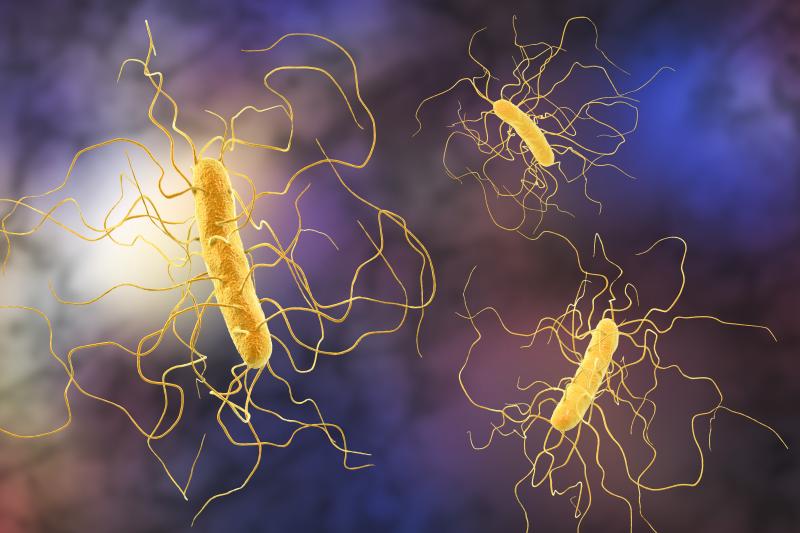Study Shows High-Protein, High-Fat Diets Promotes Dangerous Clostridioides Difficile Infections
Source: Thailand Medical News Feb 12, 2020 5 years, 2 months, 2 days, 9 hours, 43 minutes ago
Each year globally, almost a million people are diagnosed with
C. difficile infections and more than 140,000 die, according to the Centers for Disease Control and Prevention. It was also observed that taking antibiotics increases a person's risk of infection.
 Clostridioides difficile
Clostridioides difficile infection (
CDI or C-diff), also known as
Clostridium difficile infection, is a symptomatic infection due to the spore-forming bacterium
Clostridioides difficile. Symptoms include watery diarrhea, fever, nausea, and abdominal pain. It makes up about 20% of cases of antibiotic-associated diarrhea. Complications may include pseudomembranous colitis, toxic megacolon, perforation of the colon, and sepsis.
Risk factors for infection include antibiotic or proton pump inhibitor use, hospitalization, other health problems, and older age.
A new study has found that
diets like the Keto, Paleo and Atkins that focus on
high-fat, high-protein meals but are often low in carbohydrates appeals to the
Clostridioides difficile bacteria.
A study published this week in mSystems, an open-access journal of the American Society for Microbiology, report that mice fed a
high-protein, high-fat diet were more likely to acquire a deadly
C. difficile infection than mice eating a standard
diet. Their findings also suggest that a diet high in carbohydrates protects against infection.
The medical researchers behind the new work caution that their study was done on mice and additional research is needed to establish a connection between these diets and infections in people. At the same time, they argue, it's an avenue of research that's important to explore.
Dr Ernesto Abel-Santos, Ph.D., at the University of Nevada, Las Vegas (UNLV told
Thailand Medical News, "We have to look at humans to see if it correlates. We know that people have been following these different extreme
diets and we really don't have a good handle on what these changes are doing to our systems."
Microbiologist Brian Hedlund, Ph.D., also at UNLV added, "We know very well that
diet affects the
gut microbiome." Hedlund and Abel-Santos co-led the new study.
The researchers studied 4 groups of mice with 5 animals each. Each group received antibiotics and was fed a different
diet: one was
high-fat, high-protein; another was high-fat, low-protein; a third was high-carbohydrate; and the fourth was a standard laboratory
diet for experimental mice.
The study results were
startling. In the
high-protein, high-fat group, all the animals developed severe infections and died within 4 days. In the high-fat, low-protein group, only 2 animals died. In the high-carbohydrate group, 2 mice showed mild symptoms and recovered and in the standard diet group, all of the animals showed signs of infection but also recovered.
Newer studies suggest that because antibiotics kill bacteria species indiscriminately, the medications decimate populations of organisms that compete for amino acids, leaving
C. difficile free to propagate.
However Hedlund said the story is even more complex. "It's clear that it's not just a numbers game," he said.
The research suggests that
diet may promote microbial groups that can be protective, even after antibiotics. For an infection to flourish, he said, "you might need this combination of wiping out
C. difficile competitors with antibiotics and then a
diet that promotes overgrowth and disease."
The recent study raised questions that the researchers will pursue in future studies. For example: The high-carb
diet, which seemed protective against
C. difficile infection, gave rise to the least diverse community of microbes. "Lots of papers say that a lower microbial diversity is always a bad thing, but in this case, it had the best disease outcome," said Dr Abel-Santos. However, he cautions that a high-carb
diet could lead to animals becoming asymptomatic carriers that can disseminate the infection to susceptible subjects.
The researchers will also begin looking at ways to understand the connection between
diet and
C. difficile infection in people. "Whether this will translate to humans or not, I'm not totally sure," said Dr Abel-Santos. "But the next time I take antibiotics, I'm not going to be eating a high-protein or Atkins
diet."
Reference : A High –Fat /High-Protein, Atkins Diet Exacerbates Clostridioides (clostridium) difficile Infection in Mice, whereas a High-Carbohydate Diet Protects. Chrisabelle C. Mefferd, Shrikant S. Bhute, Jacqueline R. Phan, Jacob V. Villarama, Dung M. Do, Stephanie Alarcia, Ernesto Abel-Santos, Brian P. Hedlund
DOI: 10.1128/mSystems.00765-19
